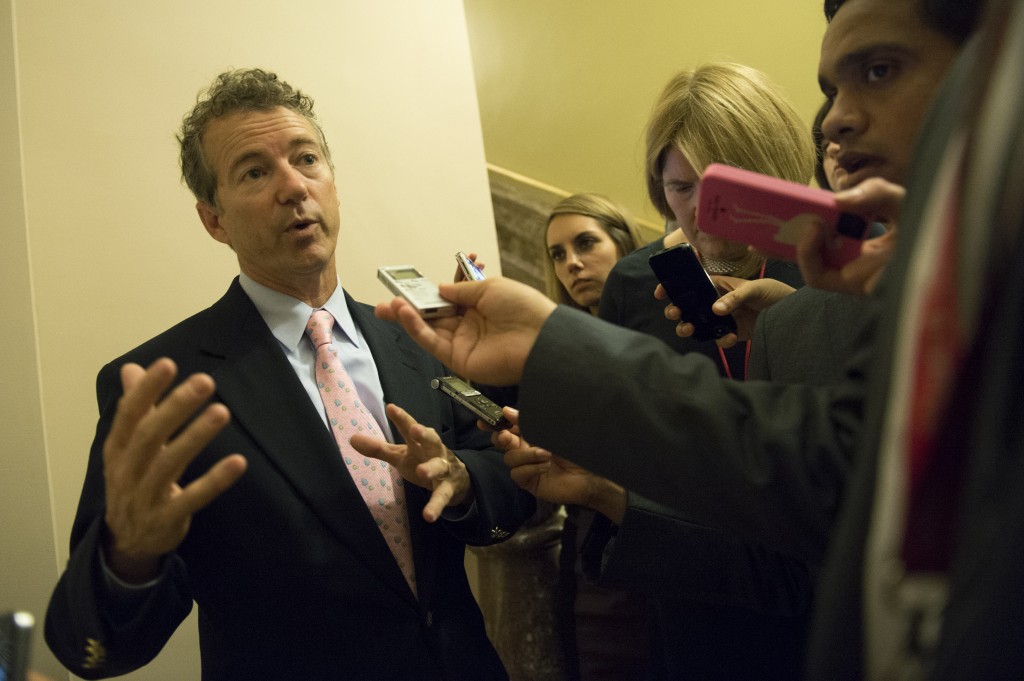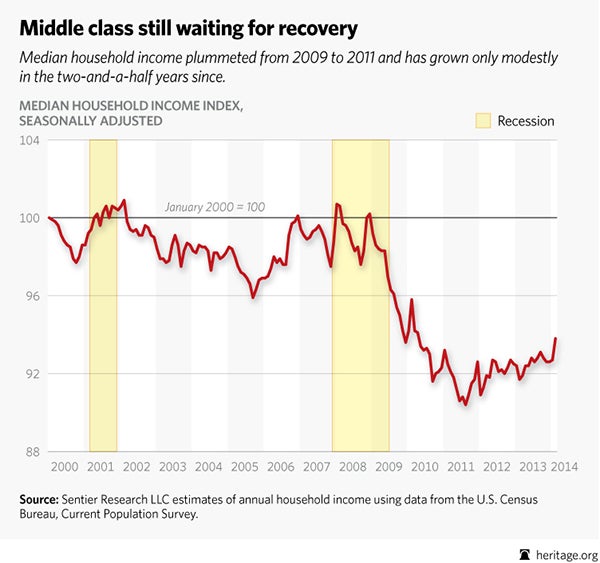There was more bad news for workers’ paychecks in the recent April jobs report. Wages and salaries were flat. No raise at all – not even to keep pace with inflation.
Yet President Barack Obama continues to obsess over raising the minimum wage – as if he holds a magic wand to make American workers better off. Even some Republicans are advocating the same policy as a misguided strategy to help the working poor. Obama says it is time working people “got a raise,” and he’s right. But we’d argue that raising the minimum wage to $10.10 is a clever diversion from the real crisis: falling middle-class incomes.
For the vast majority of workers, the problem isn’t a flat minimum wage; it’s a declining middle-class paycheck. The minimum wage affects, at most, only 6 percent of workers – and almost half of them are in starter jobs or are teenagers. What about the other 95 percent – especially those working parents with children?
These are the people who desperately need a raise. According to statistics from Sentier Research based on monthly Census Bureau data, the median household income in inflation-adjusted dollars is still some $4,000 lower today than it was before the recession began in 2008, and about $2,000 lower than it was since the recovery began in June of 2009.
Usually, periods of recovery from a financial meltdown are years when workers rapidly make up lost ground in income and job opportunities surrendered during the recession. In this case, average workers have continued to lose ground. This explains why more than half of workers think the recession never ended. For them it hasn’t.
This bitter pocketbook reality speaks loudly to the utter failure of Obama’s economic policies – bailouts, stimulus plans, $5 trillion more in debt-financed spending, Obamacare, failed green energy investments, and tax hikes. This president has thrown everything from the liberal playbook at this stagnant economy and, alas, none of it has worked.
To be fair, the wage meltdown really began at the end of the Clinton years when the technology and dot-com bubble burst. The chart below shows the disturbing trend of middle-class earnings. We suspect that a major reason for the lack of progress in the 2000s was a weak dollar that shrunk the real purchasing power of Americans’ earnings. The price of gold has quadrupled from 2000 to 2014, rising from $300 to $1,300 per ounce.
Even if a raise in the minimum wage didn’t destroy jobs – which it would, with the Congressional Budget Office predicting about half a million jobs lost – this policy would do nothing for the middle class. It might actually hurt workers by making the price of a McDonald’s Big Mac or a hotel stay a little more expensive.
The average salary in the U.S. is not $7.25 an hour as Obama seems to think, but $23 an hour – or triple the minimum wage.
The jobs report told us something else that is crunching the working class: Workers are having a harder time than ever finding a full–time, 40-hour–a-week job. Employers we talk to tell us that this is in part due to Obamacare rules that are holding many new positions below 30 hours a week. (Since when is 30 hours a week a full-time job, anyway?)
The White House’s new proposed overtime rules are another misdirection play: Mr. President, the problem is workers are getting too few, not too many hours on the job.
Obama’s tax increases have also held down wages. It has been a truism for at least 100 years – and probably for time immemorial – that worker pay rises with the productivity of workers. It’s simple: The more widgets or potato chips or microchips a worker produces, the more the employer will pay her. In last week’s dismal GDP report, business investment in plants, equipment, and technology fell. That matters to workers because with less capital to work with, they aren’t as productive and they can’t command higher wages.
Almost every economist agrees with that, so why discourage investment with higher tax rates on business investments and profits? We should move in the opposite direction and eliminate much of the double taxation on investment, and that will pay dividends for workers.
Finally, lifting middle-class wages requires that new jobs created pay more than the jobs they replace. President Obama’s war on fossil fuels – oil, natural gas, and coal – is killing the creation of high-paying energy jobs. In the oil and gas industry, for example, welders, petroleum engineers, geologists, truck drivers, and pipe fitters earn $75,000 to more than $100,000 a year. This is 50 percent higher or even double the average wage. And the industry could be creating millions more of these good jobs, if the federal government would stop regulating and trying to impose new taxes on the nation’s premier job creators. We should be dramatically expanding our drilling and mining capacities, not holding them back.
The squeeze on the middle class is real and painful for tens of millions of anxiety-ridden Americans. A pro-growth agenda will help raise everyone’s wages without hurting the people with the least skills and education.
Rand Paul is a Republican U.S. senator from Kentucky. Stephen Moore is senior economist at The Heritage Foundation.

































